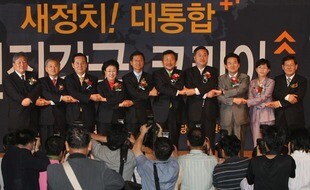hankyoreh
Links to other country sites 다른 나라 사이트 링크
Liberals propose mobile voting to promote party primary

Will it be possible for the general public to participate in the primary vote using their mobile phones? As various factions of liberals, or the so-called pan-ruling party circle, have agreed to form a new unified party, the question of whether or not to introduce “mobile voting,” which was proposed as a possible way to hold the party primary, is attracting people’s attention.
The liberal group, which is made up of pro-government Uri Party members and defectors from the Uri Party, the minor opposition Democratic Party and the main opposition Grand National Party, announced on July 24 that they would set up a new political party by early August, in order to field a candidate in the presidential election, slated for December this year.
Mobile voting has officially been proposed by a faction in the soon to-be-established liberal party. Under the voting system, voters can choose either to vote at a polling booth or to vote using their mobile phones. Supporters of the idea anticipate that because people can vote using their mobile phones, without having to go to a polling booth, it will be possible for approximately 5 million people to participate in the primary vote.
If that happens, the party predicts that a kind of voting fever will take hold, similar to that which swept the nation in the 2002 primary and attracted 2 million participants. At the time, the liberal primary was widely considered to have been the key which enabled them to gain a foothold on winning the presidential election, which took place at the end of that year. As many will recall, current President Roh Moo-hyun surged through the primary and went from being a minor political player to winning the party’s candidacy and prevailing in the election.
Most of the presidential hopefuls in the pan-ruling party circle agree to the idea of mobile voting, but some have reacted negatively, citing the difficulty with identifying voters and the increased possibility of proxy voting. Under the proposed system, those participating in mobile voting would be identified by their resident registration number, which is a requirement for mobile phone service use, however, the possibility of proxy voting would still exist.
Considering the uncertainty of the situation, some maintain that mobile voting should be limited. In the process of discussing the rules for the upcoming primary, Rep. Lee Mok-hee, co-director of a conference organized to promote the primary, said, “During the 2002 primary, Internet voting results accounted for 5 percent of the vote. Mobile voting results can be partially reflected in the vote by converting the results into a certain ratio.”
Chung Chang-gyo, one of those advocating for mobile voting, said, “We need to find a new way of promoting the primaries. This year, we should get over the idea that people select presidential candidates from voting booths installed in gymnasiums and try something new,” referring to the fact that much of the voting throughout the nation takes place in school facilities.
A preparatory committee, organized to launch the new united party of the pan-ruling party circle, plans to decide whether or not to introduce mobile voting at the beginning of August. As a first step, the preparatory committee is planning to seek opinions from information technology experts about the possibility of guaranteeing the fairness of mobile voting from a technological standpoint, and plans to demonstrate mobile voting during its inaugural convention on August 5.
Please direct questions or comments to [englishhani@hani.co.kr]
Editorial・opinion
![[Column] Park Geun-hye déjà vu in Yoon Suk-yeol [Column] Park Geun-hye déjà vu in Yoon Suk-yeol](https://flexible.img.hani.co.kr/flexible/normal/500/300/imgdb/original/2024/0424/651713945113788.jpg) [Column] Park Geun-hye déjà vu in Yoon Suk-yeol
[Column] Park Geun-hye déjà vu in Yoon Suk-yeol![[Editorial] New weight of N. Korea’s nuclear threats makes dialogue all the more urgent [Editorial] New weight of N. Korea’s nuclear threats makes dialogue all the more urgent](https://flexible.img.hani.co.kr/flexible/normal/500/300/imgdb/original/2024/0424/7317139454662664.jpg) [Editorial] New weight of N. Korea’s nuclear threats makes dialogue all the more urgent
[Editorial] New weight of N. Korea’s nuclear threats makes dialogue all the more urgent- [Guest essay] The real reason Korea’s new right wants to dub Rhee a founding father
- [Column] ‘Choson’: Is it time we start referring to N. Korea in its own terms?
- [Editorial] Japan’s rewriting of history with Korea has gone too far
- [Column] The president’s questionable capacity for dialogue
- [Column] Are chaebol firms just pizza pies for families to divvy up as they please?
- [Column] Has Korea, too, crossed the Rubicon on China?
- [Correspondent’s column] In Japan’s alliance with US, echoes of its past alliances with UK
- [Editorial] Does Yoon think the Korean public is wrong?
Most viewed articles
- 1[Column] Park Geun-hye déjà vu in Yoon Suk-yeol
- 2Why Korea shouldn’t welcome Japan’s newly beefed up defense cooperation with US
- 3[Guest essay] The real reason Korea’s new right wants to dub Rhee a founding father
- 4Will NewJeans end up collateral damage in internal feud at K-pop juggernaut Hybe?
- 5Thursday to mark start of resignations by senior doctors amid standoff with government
- 6N. Korean hackers breached 10 defense contractors in South for months, police say
- 7[Column] ‘Choson’: Is it time we start referring to N. Korea in its own terms?
- 8Kim Jong-un expressed ‘satisfaction’ with nuclear counterstrike drill directed at South
- 9[Editorial] New weight of N. Korea’s nuclear threats makes dialogue all the more urgent
- 10Senior doctors cut hours, prepare to resign as government refuses to scrap medical reform plan